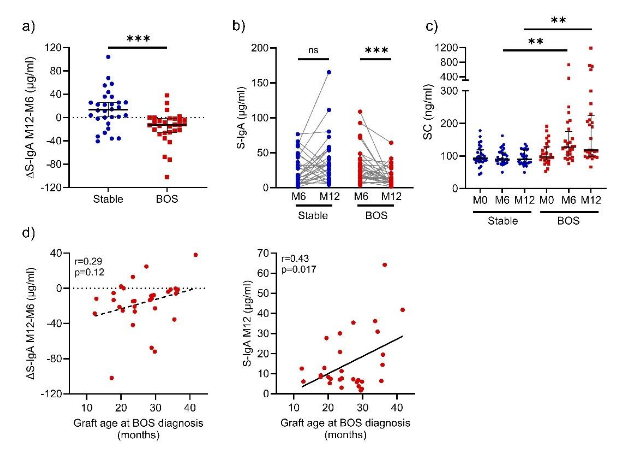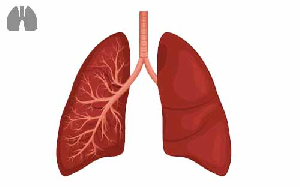
Abstract
Rationale.
Bronchiolitis obliterans syndrome (BOS) limits long-term survival after lung transplantation (LuTx) and may be triggered by infections. As immunoglobulin (Ig)A is crucial to ensure adequate mucosal immunity, we explored whether IgA-related mucosal immunity is impaired in BOS.
Methods.
Sixty LuTx recipients from the COLT cohort were retrospectively included. All participants were in stable condition within the first year post-transplant. At 3.5 years post-LuTx, 30 remained stable and 30 had developed BOS. Bronchoalveolar lavage fluid (BALF) and sera collected pre-transplant and at 6 (M6) and 12 months (M12) post-transplant were assessed for monomeric IgA, secretory (S)-IgA, secretory component (SC) and cytokine profiling. Second, bronchiolar polymeric Ig receptor (pIgR) expression and subepithelial IgA-producing B-cell numbers were compared across graft tissue samples from 54 LuTx recipients classified as stable, pre-BOS, BOS or end-stage BOS.
Results.
S-IgA levels in BALF decreased between M6 and M12 (p=0.0001) and were reduced in BOS patients at M12 (p=0.0018). Patients with lower S-IgA levels had higher infection rates. BOS patients exhibited elevated SC levels in serum (p<0.01). Both reduced S-IgA in BALF and increased SC in serum were associated with higher risk of BOS. Lastly, a reduction in bronchiolar pIgR expression was observed in BOS patients (p=0.0001), that paralleled BOS severity.
Conclusions.
This study demonstrates an early impairment of mucosal IgA immunity in LuTx patients, which was linked to the later development of BOS, suggesting that IgA-related markers may serve as early predictors of BOS onset.














